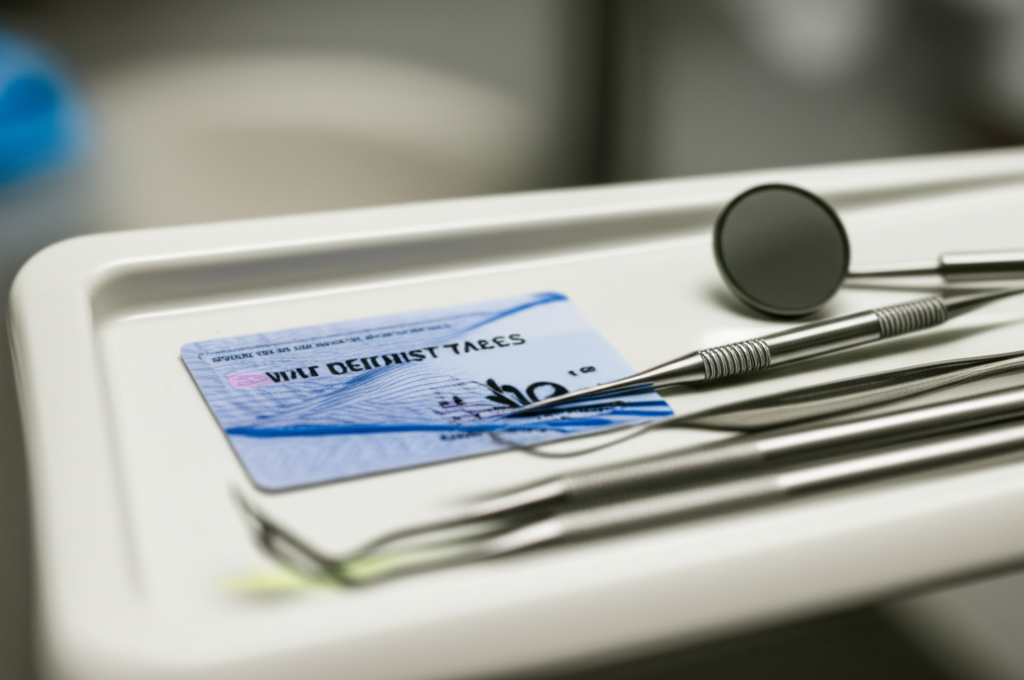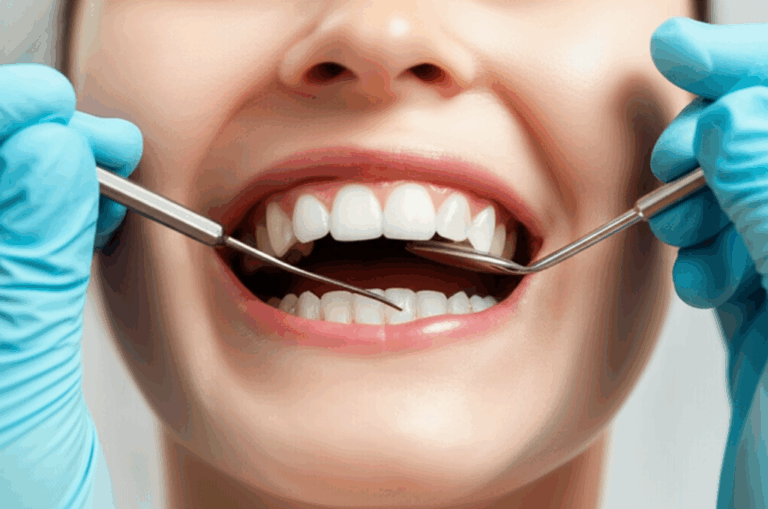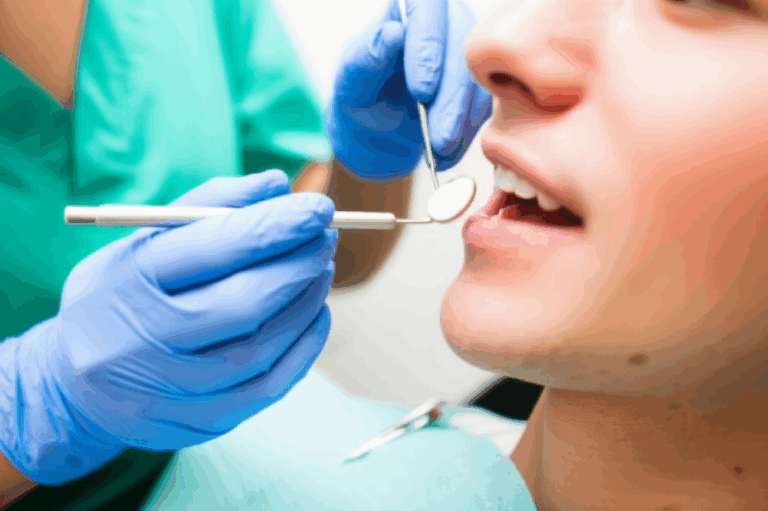
What Dentist Takes Medical? A Friendly, Clear Guide to Dental Care and Medical Insurance
Have you ever looked at a big bill for dental work and thought, “Can’t my medical insurance just pay for this?” Maybe you need your wisdom teeth out, you have jaw pain, or you suddenly need emergency dental surgery. If you’re googling “what dentist takes medical,” you’re not alone—lots of people have the same questions.
Many folks get confused about the difference between dental and medical insurance. If you’re worried about money, annoyed by paperwork, or just want someone to explain things simply, this guide is for you. Let’s go step-by-step so you can get the care you need and not feel lost.
In This Article
- Understanding the Dental vs. Medical Insurance Difference
- When Does Medical Insurance Pay for Dental Work?
- Dentists Who Take Medical Insurance
- Finding a Dentist Who Takes Medical: Easy Steps
- Good Questions to Ask Your Dentist
- The Billing Puzzle: Codes, Pre-Approvals, and More
- If Medical Insurance Says “No”—Other Low-Cost Ways
- Wrapping Up: Clear Steps for Your Dental Health
Relatable Hook: “Can My Medical Insurance Help Me at the Dentist?”
Imagine this: Maybe you don’t have dental insurance. Maybe your dental plan ran out or doesn’t cover much. Now you need something big—wisdom teeth surgery, a hurt jaw, or pain that’s getting worse. The costs look scary. So, you wonder, “What kind of dentist takes medical insurance? Is there a way to get this paid for?”
You’re not the only one. Tons of people every year find out that the split between “dental” and “medical” isn’t very clear. If you’re confused, this guide is here to help.
Understanding the Dental vs. Medical Insurance Difference
Let’s make this simple: Why don’t dental and medical insurance pay for the same stuff?
Dental Insurance
- What it pays for: Cleanings, simple X-rays, fillings, crowns, some root canals—mostly checkups or fixes.
- Limits: Low yearly maximums (often $1,000–$2,000), some stuff not covered, waiting periods for big jobs.
- Why: Dental insurance is made to help pay for yearly care, not big emergencies.
Medical Insurance
- What it pays for: Sickness, injuries, things that affect your whole body, hospital care.
- Dental overlap: It only steps in if your mouth problem is medically needed—meaning it’s connected to your overall health or a special health problem.
Where They Meet
Some mouth problems become a health problem for your whole body. Like if you break your jaw in a fall or get a big infection in your mouth, your medical insurance might help out. The main thing to remember is: Medically needed care.
Simple example: Dental insurance is like getting oil changes for your car. Medical insurance pays when you get in an accident.
When Does Medical Insurance Pay for Dental Work?
Medical insurance won’t pay for cleanings or small cavities. But, in certain cases, it will help pay:
A. Oral Surgery
- Wisdom Teeth Removal: Especially if they are stuck or causing infections.
- Fixing Broken Jaws or Face Injuries: After things like car crashes or big accidents.
- Taking Out Tumors or Cysts: Bad growths in your jaw or mouth.
- Big Tooth Extractions: If they’re too hard for a regular dentist.
B. Medically Needed Treatments
- TMJ Issues: Jaw joint pain or limited jaw movement.
- Sleep Apnea Devices: Mouthpieces that help keep you breathing at night.
- Problems from Other Illnesses: Mouth problems connected to diabetes, cancer, heart disease.
- Bad Infections: Dental abscesses or other infections that could spread.
- Biopsies: Taking and testing weird mouth tissue.
C. When You Need a Hospital or Anesthesia
- Must Be in a Hospital: Sometimes if your health is complicated.
- General Anesthesia: For really tough or risky dental operations.
D. Rebuilding After Big Problems
- After Cancer or Big Injury: Fixing the mouth or jaw after disease or accidents.
- Fixing Birth Problems like Cleft Palate: Surgery for how the mouth or jaw is built.
Quick tip: If your mouth problem is serious and affects your health, medical insurance is more likely to pay.
Extra Examples
- A child with a cleft palate will often get surgeries paid for by medical insurance.
- People going through cancer treatment sometimes get needed dental work paid by medical, not dental, insurance.
Dentists Who Take Medical Insurance
Not every dentist deals with medical insurance. Most don’t, because it’s tricky. Here’s who does:
1. Oral and Maxillofacial Surgeons (OMS)
These dental surgeons handle tough cases—wisdom teeth, jaw surgery, trauma, and tumors. They often have hospital jobs and know about medical insurance.
2. Dentists Who Work in Hospitals
Some dentists are part of hospital teams. They treat people with tough cases, bad health, or those needing anesthesia. They understand how to bill medical insurance.
3. Dental Specialists (Periodontists, Endodontists)
- Periodontists: Treat gum diseases, especially if other illnesses are involved.
- Endodontists: Handle bad infections or root canals if infection spreads.
4. Community Clinics or Federally Qualified Health Centers (FQHC)
These community clinics, which work with Medicaid and special cases, may be better at handling medical insurance.
5. Dental Schools and University Clinics
Dental schools take complex cases to help students learn, and they may bill your medical insurance when possible.
Finding a Dentist Who Takes Medical: Easy Steps
Now that you know who might help, here’s how to get started:
A. Call Your Medical Insurance
- 1. Read Your Policy: Look for “Oral Surgery,” “TMJ,” “Anesthesia,” or “Dental Coverage” sections.
- 2. Call Customer Service: Ask, “Does my plan cover wisdom teeth surgery, jaw surgery, or [your problem]?”
- 3. Ask About Billing: See if they allow dental procedures to be billed as medical.
- Tip: Write down the person’s name and what they say.
B. Talk to Your Regular Doctor
Doctors can refer you to specialists and write a “medical need” letter—which is often needed for insurance.
- What to say: “My dentist said I need X. Will my medical insurance pay? If so, can you refer me and write a letter?”
C. Call Dental Offices
- 1. Call Oral Surgeons First: They’re most likely to work with medical insurance.
- 2. Be Specific: “Do you bill medical insurance for wisdom teeth removal/TMJ/hospital dentistry?”
- 3. Ask About Insurance Networks: Are they part of your insurance group?
D. Try Online Searches
- Check Your Insurer’s List: Look for “oral surgeons”, “maxillofacial surgeons”, “hospital dentists.”
- Look for Filters: Such as “takes medical insurance.”
Smart tip: Take your insurance card and any letters to your first visit to help with billing.
Good Questions to Ask Your Dentist
Before starting, clear communication helps. Ask these:
Ask for written copies whenever you can. It’s your health and your money—don’t be shy!
The Billing Puzzle: Codes, Pre-Approvals, and More
This part gets a bit technical but here’s the important stuff, simply:
Codes: Translating Dental to Medical
Dentists use different codes than medical insurance wants. So, dental offices have to change your procedure into “medical language” with special codes.
- Not all dental offices do this. That’s why oral surgeons and hospital dentists are your best bet.
Medical Need Proof
- What it is: Proof the care is needed for health—not just looks.
- What to bring: Doctor letters, X-rays, records of your problem.
- Why: No proof, no payment. Medical insurance needs to see you really need it.
Getting Approval Before Work
You’ll often need insurance “okay” before starting. If you don’t, insurance might refuse to pay.
- Tip: Make sure your dental office handles this, and you get confirmation too.
If Medical Insurance Says “No”—Other Low-Cost Ways
If your insurance still says “no,” there are other ways to pay:
A. Standard Dental Insurance
A regular dental plan may pay for part of the care.
B. Payment Plans or Financing
Most dental offices offer payment plans or low-interest loans (like CareCredit).
C. Discount Dental Plans
Not insurance, but they get you lower rates on certain treatments.
D. Dental Schools & Community Clinics
School clinics or community dental clinics offer care for less. Students do the work with teachers watching.
E. State and Local Programs
If money’s tight, programs like Medicaid (in some states), state dental help, or charities may help.
- Tip: If you qualify, check for veterans’ dental benefits, CHIP (for kids), or TRICARE (military families).
Your Options Explained: At-Home vs. Professional Care
It’s natural to want to save money, but some mouth problems need a dentist. For small issues, home care can help.
At-Home Oral Care
- Brush gently with soft brush.
- Use toothpaste with fluoride.
- Floss daily.
- Rinse with warm salt water for sore spots.
- Use a cold pack to help with swelling.
When to See a Dentist
- Bad pain, swelling, or jaw won’t open.
- Injury (broken teeth, face hurt).
- Sores, bumps, or ulcers that won’t go away.
- Ongoing headaches or jaw pain.
- Bleeding, swollen, or pus-filled gums.
Professional Treatments
- Tooth or jaw surgery (oral surgeon).
- TMJ splints or jaw exercises (specialist).
- Sleep apnea mouthpieces.
- Biopsies or care before cancer treatment.
For bigger work—like bridges, crowns, or dental implants—your dentist might use outside dental labs for the best results.
Who Is This For? Figure Out Your Own Situation
Not all dental problems qualify for medical insurance. Here’s how to know:
People Likely to Get Medical Insurance Help:
- Your dental issue happened due to accident, injury, or ties directly to health issues (like a jaw break, hospital infection).
- Your doctor says your dental problem affects your overall health (like infections hurting your diabetes).
- You need surgery in a hospital or with anesthesia.
- You’re being treated for oral cancer, sleep apnea, or jaw trouble and need a dental specialist.
Who Might Not Get It:
- You just need a cleaning, small filling, or basic care.
- You want cosmetic work, like whitening or veneers, unless it’s for medical reasons.
- No doctor’s letter or no proof it’s medically needed.
A Note for Medicaid and Medicare
Coverage changes a lot by state and plan:
- Medicaid: Most states cover all kids’ dental needs; adults can get emergency care in some states.
- Medicare: Hardly ever pays for dental, unless it’s for jaw injury or has to be done in a hospital.
Always check your own plan.
Wrapping Up: Clear Steps for Your Dental Health
Let’s end with a quick list you can use right now:
Key Points:
- Medical insurance pays for dental work only if it’s clearly linked to your health or a big accident/illness.
- Oral surgeons, hospital dentists, and some specialists are most likely to bill medical insurance.
- Always check your policy or call your insurance company to know what’s covered.
- Get doctor letters and keep all your paperwork.
- Ask your dentist: Do they take medical insurance? Are they in your plan? Will they help with codes and approval?
- If medical insurance can’t help, look into dental insurance, payment plans, or dental schools and clinics.
Easy Action Steps:
Remember, your mouth is part of your health. If your dental problem is making you unwell or unsafe, you might be able to get more coverage than you think. Stay on top of things, don’t give up, and know you’re not alone.
Still Have Questions?
If you’re unsure or stuck, reach out to a trusted dentist or call your insurance’s help line. Ask questions until you understand what’s covered so you can take care of both your health and your wallet.
Getting better dental (and overall) health starts with taking that first step and asking the right questions. Stay curious—and remember, you’re not on this journey alone.








